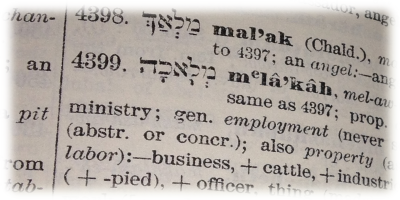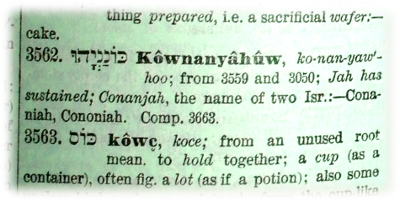Hebrew words must be defined from within their original Hebraic culture and context. This study will examine how Hebrew words are defined in mainstream translations, to see if they have remained true to the Hebrew text.
A Hebrew Word Study
KJV Genesis 6:5 And GOD saw that the wickedness of man was great in the earth, and that every imagination of the thoughts of his heart was only evil continually.
KJV Psalm 40:8 I delight to do thy will, O my God; Yea, thy law is within my heart.
RSV Exodus 23:9 "You shall not oppress a stranger; you know the heart of a stranger, for you were strangers in the land of Egypt.
KJV Jeremiah 9:8 Their tongue is as an arrow shot out; it speaketh deceit: one speaketh peaceably to his neighbour with his mouth, but in heart he layeth his wait.
RSV Psalm 7:9 O let the evil of the wicked come to an end, but establish thou the righteous, thou who triest the minds and hearts, thou righteous God.
When doing a word study, such as we are doing here with the word "heart," we are assuming that the Hebrew word behind each English word "heart" is the same. Is this true? By simply using a concordance we can easily check each of these translations to see what Hebrew word lies beneath the word "heart." What we find in Genesis 6:5 is the Hebrew word lev, which does mean "heart." In Psalm 40:8 we find the Hebrew word me'ah meaning the "gut." In Exodus 23:9 it is the word nephesh meaning "being" or "person." In Jeremiah 9:8 it is qerev meaning the "insides." In Psalm 7:9 it is kil'yah meaning "kidneys."
Each of these Hebrew words has a specific meaning which the translators have chosen to ignore and just translate all five of these Hebrew words as "heart." Because the Hebrew bible is Hebraic in origin, it is written from a very Hebraic perspective. Our own Greco-Roman culture is very different from the Hebrew culture and we do not think in Hebraic terms. For this reason, the translators have removed the Hebraicness of the text and have converted it into one that is more in-line with our Greco-Roman thought. While this may seem trivial, it changes the meaning the original author had intended.
Now, let's use the concordance to look up verses that do you use the Hebrew word lev, meaning heart, to see if the translators have translated this word consistently. In each of the verses below, the underlined word is the translator's translation of the Hebrew word lev.
Genesis 31:20 And Jacob stole away unawares to Laban the Syrian, in that he told him not that he fled.
Exodus 9:21 And he that regarded not the word of Jehovah left his servants and his cattle in the field.
Numbers 16:28 And Moses said, Hereby ye shall know that Jehovah hath sent me to do all these works; for I have not done them of mine own mind.
Job 36:5 Behold, God is mighty, and despiseth not any: He is mighty in strength of understanding.
Psalm 83:5 For they have consulted together with one consent; Against thee do they make a covenant:
Proverbs 19:8 He that getteth wisdom loveth his own soul: He that keepeth understanding shall find good.
Again, the translators have ignored the original text, erased its original Hebraicness and replaced it with words more fitting to Greco-Roman thought. What exactly is the meaning of the Hebrew word lev?
RSV Psalm 7:9 O let the evil of the wicked come to an end, but establish thou the righteous, thou who triest the minds and hearts, thou righteous God.
In the above verse, the Hebrew word lev is translated as "mind." While we usually equate the "heart" with emotions, Hebraicly, it means the "mind." Also found in the above verse, is the word "hearts," which we already found to be the Hebrew word kil'yah, meaning the "kidneys." In Hebraic thought, the kidneys are the seat of "emotions."
Addition of words to "fix" the text
KJV Genesis 4:1 ...I have gotten a man from the LORD.
RSV Genesis 4:1 ...I have gotten a man with the help of the LORD."
In this verse, from two different translations, the underlined words have been added to the text and do not appear in the original Hebrew text. The literal rendering of this verse, from the Hebrew is, "I have gotten a man with the LORD." The Hebrew text implies that Hhawa (Eve) had relations with YHWH (the LORD), but it is possible that the Hebrew text is in error (not all that uncommon). It is my opinion that the translator should, at the least, footnote the addition of any words inserted into the text.
RSV Genesis 32:1-4 Jacob went on his way and the angels of God met him; and when Jacob saw them he said, "This is God's army!" So he called the name of that place Mahanaim. And Jacob sent messengers before him to Esau his brother in the land of Seir, the country of Edom,instructing them, "Thus you shall say to my lord Esau: Thus says your servant Jacob, `I have sojourned with Laban, and stayed until now;
In this passage, Jacob comes across "angels." Then, he sends off "messengers" to meet with his brother. From this translation we would never have realized that the "angels" Jacob met, are the very same "messengers" he sends to his brother. The Hebrew word behind both of these English words is malakh, literally meaning messengers.
Greek Influence on translations
We are all familiar with the name "Moses," however, the pronunciation of this name comes from the Greek Septuagint (a 2,000 year old translation of the Hebrew Bible). The correct Hebrew pronunciation is Mosheh. Another example of this is the name "Eve," again from the Greek Septuagint. The Hebrew pronunciation is Hhawa.
Did you know that the word "manna" never occurs in the Hebrew Bible? The word manna, for the bread-like substance that was given to the Israelites while in the wilderness, is actually called mahn. The term "manna" comes from; you guessed it, the Greek Septuagint.
This use of the Greek Septuagint is not limited to names only, but the translations themselves.
RSV Genesis 4:8 Cain said to Abel his brother, "Let us go out to the field." And when they were in the field, Cain rose up against his brother Abel, and killed him.
The underlined part of this verse is not found in the Hebrew Bible, but comes from the Greek Septuagint. In reality, the Hebrew text is missing what Cain said to his brother. Again, it is my opinion that translator should at least add a footnote stating that this phrase is from the Septuagint and is not found in the Hebrew text.
RSV Genesis 25:27 When the boys grew up, Esau was a skilful hunter, a man of the field, while Jacob was a quiet man, dwelling in tents.
RSV Job 1:1 There was a man in the land of Uz, whose name was Job; and that man was blameless and upright, one who feared God, and turned away from evil.
In Genesis 25:27, we read that Jacob was a "quiet" man (other translations have simple or plain). In Job 1:1, we read that Job was a "blameless" man. From this translation we conclude that the character of Jacob is different from Job. However, the Hebrew word behind both of these words, quiet and blameless, is the word tam, literally meaning "mature."
Other examples
ASV Exodus 34:28 And he was there with Jehovah forty days and forty nights; he did neither eat bread, nor drink water. And he wrote upon the tables the words of the covenant, the ten commandments.
The Hebrew translation of "ten commandments" is mitsvot eser. However, this is not what we find behind the phrase "ten commandments." In the Hebrew text it is aseret hadevariym which literally means "ten of the words" or "ten of the matters."
RSV Leviticus 19:28 You shall not make any cuttings in your flesh on account of the dead or tattoo any marks upon you: I am the LORD.
The Hebrew word for "dead" is mot, but this is not the Hebrew word here, it is nephesh meaning "being" or "person."
ASV Exodus 25:17 And thou shalt make a mercy-seat of pure gold: two cubits and a half shall be the length thereof, and a cubit and a half the breadth thereof.
The Hebrew word translated as "mercy-seat" is kaphoret, which simply means a "covering" or "lid."
RSV Exodus 4:3 And he said, "Cast it on the ground." So he cast it on the ground, and it became a serpent; and Moses fled from it.
RSV Exodus 7:9 "When Pharaoh says to you, `Prove yourselves by working a miracle,' then you shall say to Aaron, `Take your rod and cast it down before Pharaoh, that it may become a serpent.'
The Hebrew translated as "serpent" in Exodus 4:3 is nahhash, but in Exodus 7:9 it is the word taniyn. The reader is not informed that different Hebrew words are being translated as serpent. Is this significant? Maybe, maybe not.
RSV Genesis 14:20 and blessed be God Most High, who has delivered your enemies into your hand!" And Abram gave him a tenth of everything.
In this translation, the translator has inserted the word/name Abram when it does not appear in the original text. The original simply states, "and he gave him a tenth." The "he" is not identified, and may be either Melchizedek or Abram. The RSV translation "fixes" this problem by telling you it is Abram.
Uncovering the original meaning of Hebrew words
One of the major differences betwen our own Greco-Roman thought and the thought of the Ancient Hebrews, is that we commonly use abstract terms and thought while the Ancient Hebrews did not, but instead, thought and used terms that are concrete in nature. The following verse will easily demonstrate this difference.
KJV Exodus 17:14 And the LORD said unto Moses, Write this for a memorial in a book, and rehearse it in the ears of Joshua
This is a Greco-Roman translation of the Hebrew which literally reads, "and YHWH said to Mosheh, write this remembrance in the scroll and place it in the ears of Yehoshu'a." Notice the difference? The literal translation of the Hebrew has Mosheh placing the scroll that was written upon, into the ear of Yeshoshu'a. While this is not meant to be taken literally, but figuratively, it clearly demonstrates how the Ancient Hebrews thought and wrote, from a concrete perspective.
RSV 1 Samuel 20:34 And Jonathan rose from the table in fierce anger
This verse is another example where the translation uses an abstract phrase to translate the original concrete Hebrew. The literal translation of this verse is, "And Jonathon rose from the table with his nose of fire."
One of the main focuses of the Mechanical Translation is to restore the original concrete meaning of Hebrew words. While many different methods are used to uncover the original concrete meaning, the two major ones are context and roots. Let's look at context first.
KJV Habakkuk 2:4 Behold, his soul which is lifted up is not upright in him: but the just shall live by his faith.
The word "faith" is an abstract word. The Hebrew behind this word is emunah. If we examine other passages that use this Hebrew word, and the context that it is used in, we can find its original concrete meaning.
KJV Exodus 17:12 But Moses' hands were heavy; and they took a stone, and put it under him, and he sat thereon; and Aaron and Hur stayed up his hands, the one on the one side, and the other on the other side; and his hands were steady until the going down of the sun.
The word "steady" is the Hebrew word emunah and provides us the context to understand this word from a Hebraic concrete perspective - steady or firm.
The second method examines the root of the word.
KJV Exodus 31:14 Ye shall keep the sabbath therefore; for it is holy unto you
What is "holy?" We usually assume it means something that is religiously pure. However, the word holy, and this definition, are abstract concepts. The Hebrew word is qodesh which comes from the verbal root qadash. In most cases, this verb is translated as "sanctified," another abstract term. The following verse uses this verb, but through context, provides us with a concrete meaning to the word.
RSV 2 Sam 8:10-11 ...And Joram brought with him articles of silver, of gold, and of bronze; these also King David dedicated to the LORD.
Here, the verb qadash is translated as "dedicated," which means to "set something aside for a special purpose or function." From this, we learn that the concrete meaning of qodesh is something that is "set aside for a special purpose."
Conclusions
The mainstream translations have defined Biblical words away from their original Hebraic meaning toward a Greek perspective. The "Mechanical Translation" is redefining Biblical words away from their Greek perspective back to their original Hebraic meaning.

Like what you’re discovering? Continue the journey from Bible reader to translator.
|







